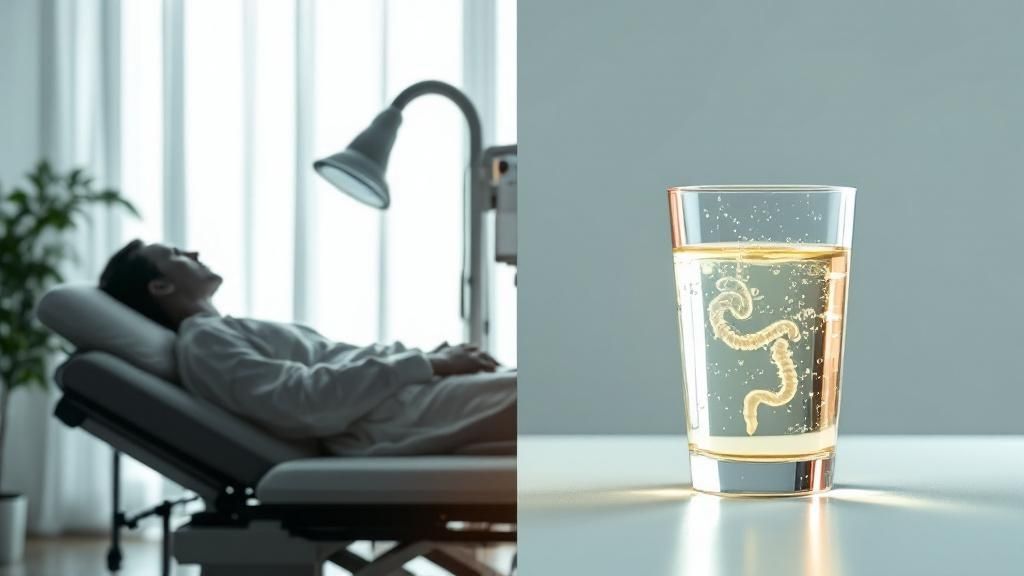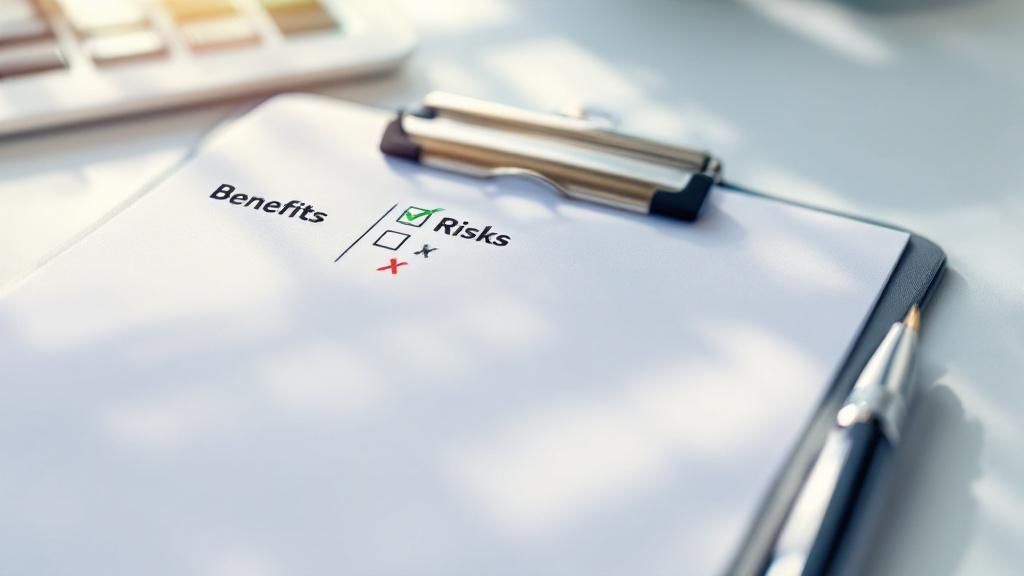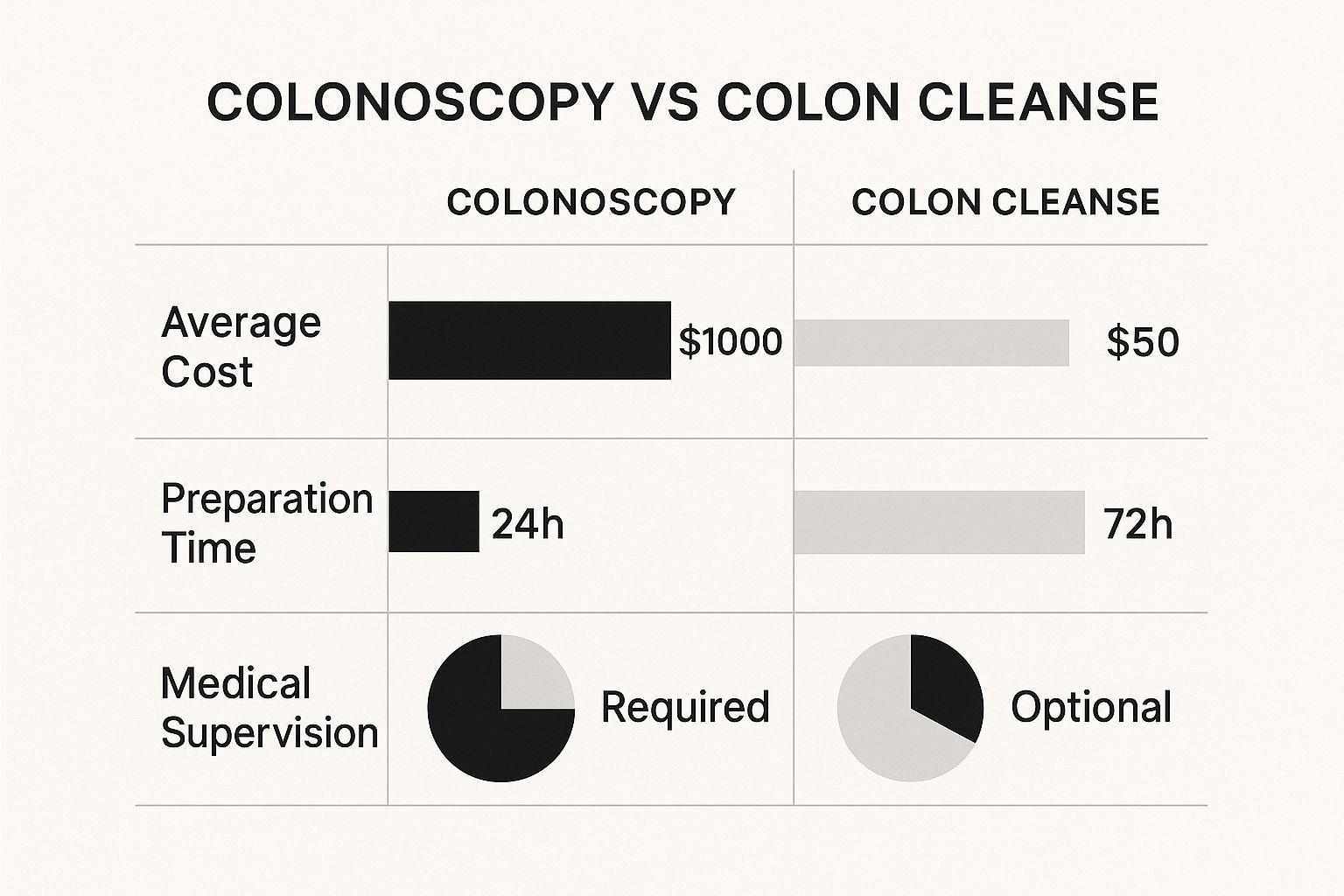When you hear "colonoscopy" and "colon cleanse," it's easy to get them mixed up. They both involve the colon, right? But that's where the similarities end. The truth is, they are fundamentally different procedures with completely separate goals. One is a critical medical screening, and the other is an optional wellness practice. Let's break down …
When you hear "colonoscopy" and "colon cleanse," it's easy to get them mixed up. They both involve the colon, right? But that's where the similarities end. The truth is, they are fundamentally different procedures with completely separate goals. One is a critical medical screening, and the other is an optional wellness practice.
Let's break down the core differences so you know exactly what you're dealing with.
Understanding the Core Difference
A colonoscopy is a potentially life-saving medical exam. A gastroenterologist—a highly specialized doctor—uses it to screen for colorectal cancer by finding and removing precancerous polyps from your large intestine. It's considered the gold standard for preventing a disease that affects thousands of people every year.
On the other hand, a colon cleanse, often called colonic hydrotherapy or a colonic, is an elective treatment. It's typically done at a spa or wellness center by a therapist, not a doctor. The goal is to flush the colon with water, supposedly to remove built-up waste and "toxins."
To put it simply, they operate in two different worlds: medicine and wellness.
Quick Comparison: Medical vs. Wellness Procedures
To see their distinct roles side-by-side, this table paints a clear picture.
| Aspect | Colonoscopy | Colon Cleanse |
|---|---|---|
| Purpose | Medical diagnosis, cancer prevention | Elective wellness, detoxification |
| Provider | Medical Doctor (Gastroenterologist) | Therapist or Technician |
| Setting | Hospital or Medical Clinic | Spa or Wellness Center |
| Scientific Backing | Evidence-based, medically necessary | Lacks robust scientific support |
This isn't just a matter of opinion; it's backed by major health institutions. The National Institute of Diabetes and Digestive and Kidney Diseases (NIDDK) provides extensive information on what a colonoscopy truly involves.

As you can see from the NIDDK resource, a colonoscopy is a serious medical examination that requires a specialist and often sedation. This really highlights its diagnostic nature and separates it entirely from the non-medical, elective world of colon cleanses.
What Is a Colonoscopy? A Medical Necessity
Let's get one thing straight: a colonoscopy is not a wellness trend. It’s a crucial medical procedure, considered the absolute gold standard by doctors for screening for colorectal cancer. Unlike a colon cleanse, which is an elective practice, a colonoscopy is a diagnostic and preventative tool performed by a highly trained specialist called a gastroenterologist.
The doctor uses a colonoscope—a long, thin, flexible tube with a high-definition camera on its tip—to get a direct, real-time look at the entire length of your colon. Think of it as a detailed internal inspection, allowing for a level of accuracy you just can't get any other way.
The Diagnostic Power of a Colonoscopy
A colonoscopy's main job is to find and deal with potential problems before they escalate into serious health issues. This isn't just about looking around; it's an active, hands-on intervention. During the exam, a gastroenterologist can spot:
- Polyps: Small growths on the colon lining that have the potential to turn into cancer.
- Tumors: Abnormal growths, which can be either benign or cancerous.
- Inflammation: Telltale signs of inflammatory bowel diseases (IBD) like Crohn's disease or ulcerative colitis.
- Sources of bleeding: Pinpointing the exact cause of symptoms like blood in the stool.
What really sets a colonoscopy apart is the ability to not only find precancerous polyps but to remove them right then and there. This simple action can stop cancer in its tracks.
A colonoscopy is unique because it’s both a diagnostic tool and a therapeutic one. Finding a polyp and removing it in one step can stop cancer before it even starts.
You might be worried about discomfort, but the procedure is done under sedation. Most people are comfortably asleep, feel nothing, and have no memory of the exam afterward.
The whole thing takes place in a medical setting, like a hospital or an outpatient surgical center. It’s a proactive step in managing your long-term health, with a clear focus on medical diagnosis and prevention, not just a temporary "clean out."
The Critical Role of Colonoscopy Preparation

The single most important factor for a successful colonoscopy isn't what happens in the procedure room—it's how well you prepare beforehand. This isn't like a gentle colon cleanse; a colonoscopy demands that your colon is completely empty. Pristine, even. If it’s not, the whole exam could be for nothing.
The reason for such a strict protocol is actually quite simple. Your gastroenterologist needs a crystal-clear, unobstructed view of your entire colon wall. They're looking for tiny, subtle changes that could signal a problem. Any leftover stool can easily hide precancerous polyps, making them impossible to find and remove.
An incomplete prep can lead to a canceled procedure right on the spot. Even worse, it could result in a missed diagnosis. This is why following your doctor's instructions to the letter isn't just a suggestion—it’s absolutely essential for your health.
Sticking to the prescribed prep plan is the only way to ensure the highest possible diagnostic accuracy. It’s a medically supervised process that’s much more involved than the simple dietary changes for a colon cleanse.
Navigating the Prep Process
The day before your procedure involves a very specific regimen designed to completely empty your bowel. Your doctor will give you detailed instructions, but they generally boil down to a few key steps:
- A clear liquid diet: This means no solid food for a full day. Think broth, clear juices, and gelatin.
- Bowel prep solution: You'll be given a special liquid designed to trigger bowel movements and thoroughly clean out your colon.
- Specific timing: When you drink the prep solution is just as important as what you drink.
Newer research shows that the timing of your prep can make a huge difference in how well it works. For instance, some studies suggest that taking the prep solution on the morning of the procedure can lead to a better-cleansed colon. One study found that adequate cleansing was achieved in 94.4% of patients using a morning-of prep, compared to just 90.2% with an evening-before plan. Patients also reported better comfort and sleep. You can read more about these colonoscopy prep findings for a deeper dive into the science.
Ultimately, a thorough prep gives your doctor the best possible chance to perform an effective screening, maximizing the incredible preventative power of this procedure.
What Is a Colon Cleanse? An Alternative Wellness Practice
While a colonoscopy is a strictly medical tool for diagnosis, a colon cleanse—often called colonic hydrotherapy or colonic irrigation—lives in a completely different world. It’s an alternative wellness practice, not a medical procedure. Its main goal isn't to screen for diseases like cancer, but to help remove what some believe is accumulated waste, toxins, and stubborn fecal matter from the large intestine.
This practice is almost always done in a non-medical setting, like a wellness center or spa, by a trained colonic therapist. The core idea is that flushing out the colon can lead to a host of benefits, like more energy, smoother digestion, and just a better sense of overall well-being. It’s important to know, however, that these claims are mostly anecdotal and haven't been backed by a lot of scientific research.
The Mechanics of Colonic Hydrotherapy
So, what actually happens during a session? A therapist uses a small, sterile tube (a speculum) to gently introduce warm, filtered water into your colon. The water then flushes through the colon, helping to dislodge and expel old waste. Think of it as an internal bath designed to cleanse the entire length of your large intestine.
Unlike a medical procedure focused on diagnosis, a colon cleanse is centered on the concept of detoxification. It operates on the belief that removing old waste will restore digestive health and vitality, a perspective rooted in wellness rather than evidence-based medicine.
A single colonic session is surprisingly thorough. It can use anywhere from 5 to 20 gallons of water to irrigate the colon, which is a volume comparable to roughly 17 enemas. Discover more insights about colonic hydrotherapy on vivawellnesswi.com.
Because the focus is on gentle, warm-water cleansing, many people find the experience quite relaxing. You can learn more about the process of colon hydrotherapy to see if this approach aligns with your personal wellness goals. Ultimately, the biggest difference in the colonoscopy vs. colon cleanse debate comes down to purpose: one is for medical necessity, the other is for personal wellness.
When you’re weighing a colonoscopy against a colon cleanse, the most important things to consider are their purpose, safety, and whether they're backed by science. At its core, a colonoscopy is a diagnostic medical procedure with a single, crucial goal: to find and prevent colorectal cancer. It's a screening tool that has been refined over decades of research and is recommended by medical groups across the globe because it has a proven track record of saving lives.
A colon cleanse, on the other hand, falls squarely in the wellness category. Its purpose is built on the idea of detoxification—the belief that flushing the colon removes harmful toxins and built-up waste. While some people swear by them and report feeling lighter or more energetic afterward, these benefits are almost entirely anecdotal. They just don't have the kind of rigorous scientific evidence that supports a colonoscopy.
A Look at Risks and Medical Oversight
It’s no surprise, then, that their safety profiles are completely different. A colonoscopy is an invasive medical exam performed by a specialist, and while it's generally very safe, it does carry small but serious risks. These can include bowel perforation, bleeding, or a bad reaction to the sedation. This is precisely why it’s always done under strict medical supervision in a clinical setting.
A colon cleanse, while not invasive in the same way, isn't without its own risks. You could experience side effects like dehydration, an imbalance of electrolytes, or, in rare cases, an infection or even a bowel injury if it's not done correctly. Since it's often performed without any direct medical oversight, it's definitely not a good idea for anyone with conditions like Crohn's disease, diverticulitis, or kidney problems. If you're just dealing with common digestive woes, you can learn more about whether colonics help with bloating and constipation.
The core distinction is this: a colonoscopy is a scientifically validated medical necessity for cancer screening, while a colon cleanse is an elective wellness choice with unproven health claims. A colonoscopy finds and removes precancerous polyps; a cleanse cannot.
To give you a clearer picture, let's break down the practical differences between these two procedures.
Detailed Comparison: Medical vs. Wellness Procedures
| Criteria | Colonoscopy | Colon Cleanse |
|---|---|---|
| Primary Purpose | Medical Diagnosis & Cancer Prevention | Wellness & Detoxification |
| Scientific Backing | Extensive, evidence-based | Largely anecdotal, lacks scientific proof |
| Medical Oversight | Required (Gastroenterologist) | Typically none |
| Key Benefit | Detects & removes precancerous polyps | Subjective feeling of "lightness" |
| Associated Risks | Perforation, bleeding, sedation reaction | Dehydration, electrolyte imbalance, infection |
As the table shows, one is a critical health intervention, and the other is a personal wellness practice. They simply aren't interchangeable.
This chart also helps visualize the differences in terms of cost, the time needed to prepare, and the level of medical supervision required.

The data really highlights that a colonoscopy is a significant medical event that demands far more in terms of resources and oversight. In contrast, a colon cleanse is a much more accessible and lower-cost wellness option you might choose for yourself.
Making an Informed Decision for Your Health

When it comes to choosing between a colonoscopy and a colon cleanse, the decision really boils down to your specific health goals and what your body needs. For anyone concerned about colorectal cancer, the answer is straightforward: a colonoscopy is the only medically recognized and effective option.
If you're over the age of 45, have a family history of colon cancer, or are dealing with symptoms like persistent digestive problems or rectal bleeding, a colonoscopy isn't just a suggestion—it's a critical medical step. A colon cleanse simply can't do the job of detecting polyps or cancer.
The most important thing to understand is that a colonoscopy is a diagnostic medical procedure, while a colon cleanse is an elective wellness treatment. One is designed to save your life, and the other is intended to help you feel your best.
A colon cleanse can absolutely be a valuable part of a personal wellness journey, much like exploring other ways to support your body's natural detoxification processes. For instance, you can learn more about how to support your body by supporting your lymphatic system with electro-lymphatic drainage therapy, which offers a broader perspective on holistic health.
In contrast, a colonoscopy relies on a scientifically proven preparation process. The specific bowel preps prescribed by doctors are designed to completely clear the colon, and studies show that certain regimens are successful in up to 92.5% of cases. This isn't a one-size-fits-all approach; factors like prep timing and your personal medical history are all carefully considered to ensure the best possible outcome.
Ultimately, your health is personal. Always have a conversation with your healthcare provider before undergoing any procedure. They are the only ones who can provide a proper diagnosis and guide you toward the best decision for your long-term well-being.
Got questions about colonoscopies versus colon cleanses? You're not alone. It's easy to get confused with all the information out there. Let's clear things up and tackle some of the most common questions we hear.
Key Distinctions and Safety
Can a colon cleanse replace a colonoscopy for cancer screening?
Let me be direct: absolutely not. A colonoscopy is the only medical procedure where a trained doctor can visually inspect your entire colon, find any precancerous polyps, and remove them on the spot. A colon cleanse, on the other hand, is essentially a flush of the colon with water—it can’t detect or prevent cancer in any way.
Are colon cleanses safe for everyone?
No, they aren't. If you have a history of conditions like Crohn's disease, ulcerative colitis, diverticulitis, or kidney disease, a colon cleanse could be risky. There's also a chance of dehydration or an electrolyte imbalance, which is why it's so important to talk to your doctor before considering one.
Crucial Takeaway: Think of it this way: a colonoscopy is a medical necessity for cancer screening. A colon cleanse is an elective wellness choice. They serve completely different purposes, and one is not a substitute for the other.
Does insurance cover a colon cleanse?
In most cases, no. Insurance companies see colon cleanses as elective or cosmetic procedures because they don't have proven medical benefits. So, you'll likely be paying for it yourself. A colonoscopy, however, is a standard preventive medical screening and is almost always covered by insurance.
Is the preparation for both procedures the same?
Not even close. Prepping for a colonoscopy involves a strict, medically prescribed bowel prep designed to completely empty the colon. This is non-negotiable—the doctor needs a perfectly clear view. A colon cleanse might just suggest some light dietary changes or a period of fasting, but it's nothing like the rigorous medical prep required for a colonoscopy. This difference really highlights how separate these two procedures are.
At Healing Waters Wellness Center, we're here to support your health journey with professional, compassionate care. Our certified practitioners specialize in colon hydrotherapy and other detox therapies designed to help you feel your best. Explore our holistic services and book your appointment today.
Article created using Outrank






